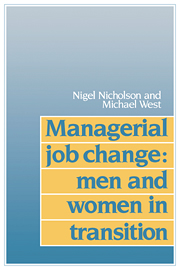Book contents
- Frontmatter
- Contents
- List of tables
- List of figures
- Acknowledgements
- 1 Men and women in transition
- 2 A managerial profile
- 3 All change: mobility patterns in management
- 4 The causes of mobility
- 5 Experiencing the Transition Cycle
- 6 Outcomes of job change
- 7 The cutting edge of change – the case of newly created jobs
- 8 Organizational career development – the management experience
- 9 Women in management
- 10 Managerial job change – theory and practice
- Appendix
- Notes
- Bibliography
- Index
10 - Managerial job change – theory and practice
Published online by Cambridge University Press: 19 October 2009
- Frontmatter
- Contents
- List of tables
- List of figures
- Acknowledgements
- 1 Men and women in transition
- 2 A managerial profile
- 3 All change: mobility patterns in management
- 4 The causes of mobility
- 5 Experiencing the Transition Cycle
- 6 Outcomes of job change
- 7 The cutting edge of change – the case of newly created jobs
- 8 Organizational career development – the management experience
- 9 Women in management
- 10 Managerial job change – theory and practice
- Appendix
- Notes
- Bibliography
- Index
Summary
We chose to focus this investigation on a national sample of middle to top ranking managers for practical and theoretical reasons. First, managerial roles are growing in number, complexity and influence, and how they are discharged is of central importance to the health and wealth of society. Second, the variety and richness of their experience of change makes them ideally suited to testing and developing ideas about the relationships between the causes, processes and outcomes of transitions. These two premises embody the highly interdependent interests of practice and theory in the study of change.
It is also apparent that the issues of job change and career development at the heart of our study are of great personal importance to the managers we have surveyed. Much has been written about these topics in the management literature yet there has been a shortage of reliable and empirical data on them. We have sought to redress this deficiency, and at the same time to specify and substantiate the theoretical links between cause and effect in the Transition Cycle. In this final chapter we shall summarize the results of the research in three ways. We shall overview what we have learned about management in transition, then evaluate how this contributes to our theoretical knowledge about the transition process, and finally we shall consider the wider implications for theory and practice in a number of academic fields.
- Type
- Chapter
- Information
- Managerial Job ChangeMen and Women in Transition, pp. 208 - 230Publisher: Cambridge University PressPrint publication year: 1988



